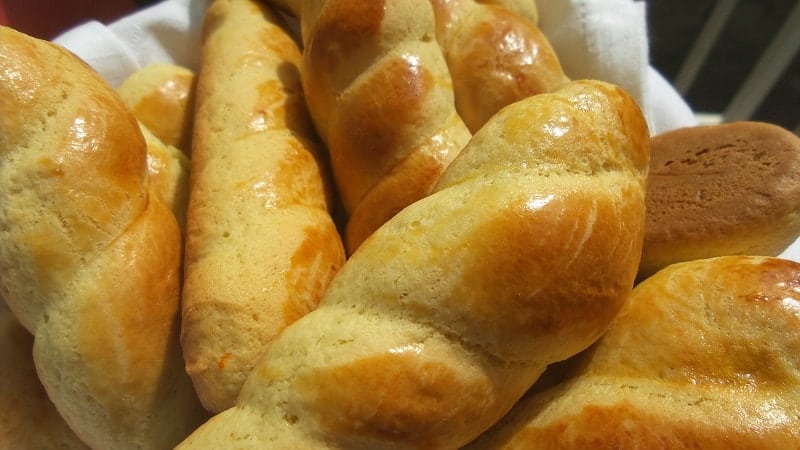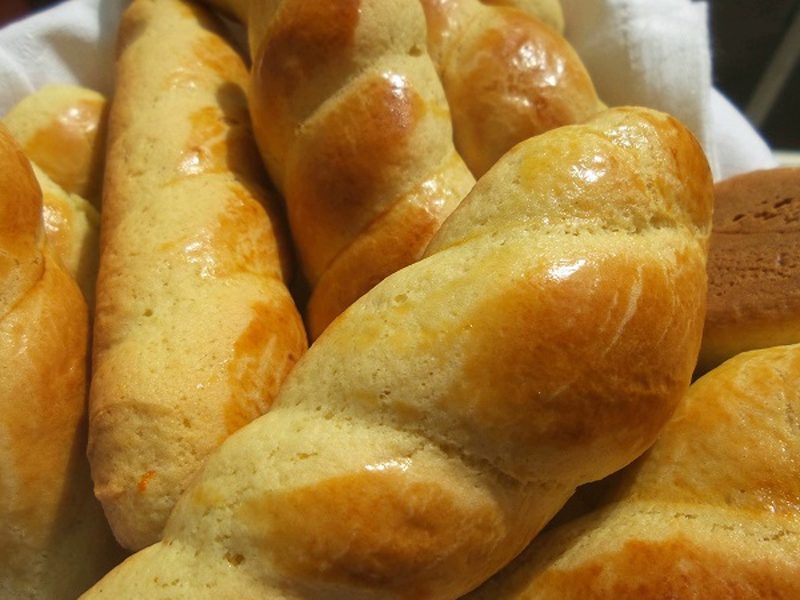Koulourakia is our favourite traditional Greek biscuit that can be eaten all year round, however, they are very popular during the Easter period.

Here is a simple recipe for soft, fluffy and delicious Koulourakia, for all the family to enjoy.
Ingredients:
- 250 x grams of unsalted butter
- 8 x eggs
- 2 x cups white sugar
- 1 x kg self-raising flour
- 1 x tablespoon vanilla sugar
- 1 x teaspoon baking ammonia (optional)
- 1 x tablespoon baking powder
- 1 x cup full cream milk
Method:
- Preheat the oven to 200 degrees celsius.
- Using an electric mixer, beat butter and sugar for about 5 minutes or until they are light and fluffy.
- One by one, add your 6 eggs and beat well. Add your white sugar and beat for a few minutes or until sugar dissolves.
- Combine milk, vanilla sugar and baking ammonia in a small bowl and mix.
- In a large bowl, sift flour and add baking powder, milk mixture and sugar mixture. Using an electric mixer, beat all together until a smooth, dough forms- make sure not to overwork it.
- Cover with cling wrap and allow to sit for an hour.
- Turn dough onto the working surface. Rub your hands together with some olive oil, so that the dough mixture won’t stick to your hands and using about one and a half tablespoons of dough, begin shaping your biscuits into your desired shape. (One method is to fold each log in half, then twist together, pressing the ends together to seal).
- Place biscuits on parchment paper-lined trays, about 2 cm apart.
- In a small bowl add 2 egg yolks and 1 tbsp water and whisk with a fork. Brush the top of the koulourakia (optional)
- Bake in preheated oven at 200C for 20 minutes, or until golden brown.
- Bake for about 20-25 minutes or until golden brown.
When is Greek Easter in 2023?
The dates for Greek Orthodox Easter in 2023 are as follows:
Good Friday - April 14, 2023
Holy Saturday - April 15, 2023
Easter Sunday or Easter Day - April 16, 2023
Easter Monday - April 17, 2023
This year, that's a week later than Western Christian Easter. Despite it being commonly called Greek Easter, this tradition is celebrated in other places apart from Greece. Other countries that officially observe Orthodox Easter include Romania, Bulgaria, Ukraine, Serbia, Moldova, North Macedonia, Cyprus, Montenegro, Georgia, Belarus and Russia.
Is it a bank holiday?
Orthodox Good Friday - also known as Great Friday and in Greek as Megáli Paraskeví - is not a bank holiday in the UK. And nor is Orthodox Easter Monday, also known as Bright Monday and in Greek as Deftéra tou Páscha.
There are no Orthodox Easter public holidays in Australia, Canada or the USA either, because - like the UK - they predominantly observe Western Christian traditions.
But those countries named above that officially observe Orthodox Easter as their main Easter will be having public holidays on their equivalent of Good Friday and Easter Monday.
How is Greek Easter celebrated?
The main date is Easter Sunday, or Easter Day, which is when Christ’s Resurrection took place. The fasting of Lent continues throughout Holy Week, which ends on Easter Sunday.
In Greece, preparations begin on Holy Thursday. Easter bread (tsoureki) is baked and eggs are coloured with red dye. Red is the colour of life and also symbolic of the blood of Christ.
Good Friday is a day of mourning. The most devout do not eat or cook at all but if any cooking must be done, it’s only simple foods such as tahini soup.
Flowers are taken to church to decorate a representation of the body of Christ, which is carried in a procession during a Service of Lamentation.
On Easter Saturday, families prepare mayiritsa, a soup made from lamb (or goat kid) offal and tripe, cooked on the stove with onions and herbs (plus an egg and lemon sauce that's mixed in at the end). Sometimes it's made with chicken instead. It's usually left on a low heat when everyone goes to church in the evening so it can be eaten when they get back.
Worshippers go to church with special white candles which are lit just before midnight as the Eternal Flame on the altar is passed around the congregation. After midnight, as Easter Day begins, there are early morning prayer services and communion.
Traditionally, worshippers carry their flame home and use it to light other candles in the house. Families then gather around the table and break their fast with soup, bread and eggs.
On Easter Sunday morning, a meal of roast lamb is made and households enjoy a feast of eating and drinking until well into the night.
In Greece itself, the Eternal Flame arrives by military jet on Easter Saturday and is given to the priests to take to their local churches. At midnight, the whole country comes to life with church bells, ships’ horns, floodlights and fireworks.


